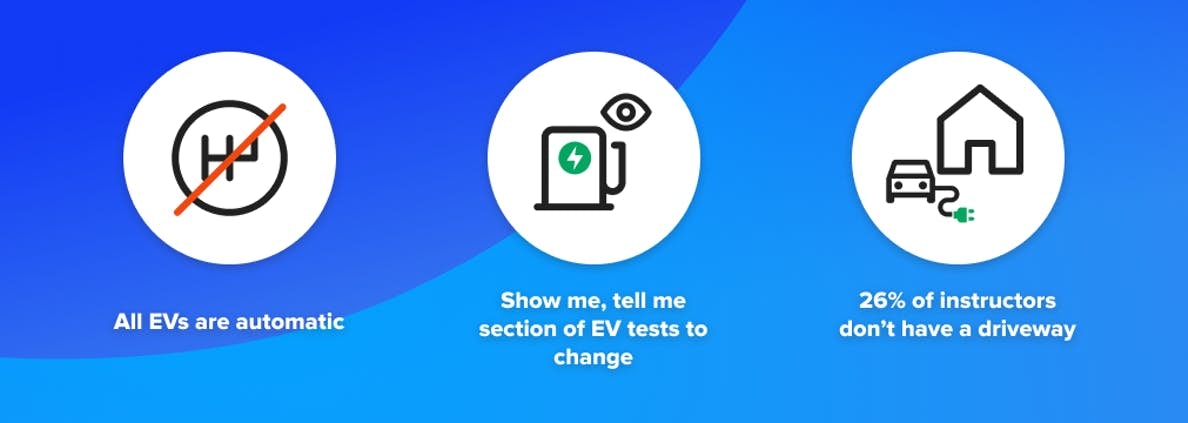Electric car driving test
With the world of motoring moving to electric it's inevitable that the electric car driving test will be the standard test in years to come, but what does a driving test in an EV look like?

How will electric vehicles impact learning to drive?
Electric cars are one of today’s biggest talking points. All new cars from 2035 will have to be electric as part of the Government's 2050 net-zero emissions target.
Soon, all new drivers will be taking their tests in electric cars. What does this mean for learners? We teamed up with RED driving school – the first UK driving school to have a learner pass their driving test in an electric vehicle – to find out what learning to drive will be like in an EV compared with the traditional petrol or diesel car.

RED driving school told us:
- Driving tests in electric cars currently follow the same rules as tests for cars with an automatic gearbox. This means that if you pass your test in an electric car, your licence only covers you to drive automatic cars, not manual.
- Instructors who have a private driveway are in a great position to purchase an electric vehicle if they are able to easily charge their car at home. However, a recent survey conducted at RED shows that 26% of instructors don’t have their own driveway or access to private overnight charging. With driving all day being part of the job, relying on public chargers can be daunting for instructors.
- It is likely that when taking a test in an electric car, most of the elements of an automatic car test will remain. There could, however, be some changes to the 'show me, tell me' section of the test, which aims to assess a driver’s knowledge of general maintenance and day-to-day running of their car. Examples of this could be asking candidates to show how to use an EV charge point or show awareness of available charge points in areas they are travelling to
All electric cars are automatic, which means new drivers don’t have to cope with the steep learning curve associated with driving a manual petrol- or diesel-powered car.
Being automatic means you don’t need to find the biting point of the clutch pedal in an electric car. Nor will you have to master tricky hill starts or predict when to change gear yourself – it’s all taken care of. This is a big difference in learning to drive, as clutch control has always been a fundamental part of learning to drive, as there’s no getting started without mastering this manoeuvre. In addition to this, learning about how to look after an electric car, understanding how to maximise range and charge your vehicle are very important factors to master.
What are the biggest differences in an electric car driving test?
According to RED the biggest difference in passing your test in an EV are as follows:

1. Differences in acceleration. While having no clutch makes electric cars simpler to drive than most, it is still a skill to learn how to accelerate and brake appropriately using an electric car’s regenerative braking.
2. Charging techniques. Ensuring that newly passed drivers understand how to use their electric car will become a key part of the driving course, to highlight the importance of planning journeys, knowing where nearby charge points are located and how far cars can go on one charge.
3. Economic use of battery power. Learners will need to demonstrate their ability to observe and anticipate battery usage.
4. Awareness of other road users. Pedestrians often use sound to indicate when a vehicle is near. Because EVs are much quieter than petrol- and diesel-powered cars, drivers should be mindful and exercise even greater awareness of pedestrians and cyclists.
5. As learning in an EV becomes more common, the driving test may evolve further with examiners checking to ensure that the driver can use the techniques needed to maximise the range of the vehicle.
Current consumer demand for EVs
- In December 2021 alone, electric cars made up 26% of sales, a record for a single month, and this figure is only set to increase in line with government imposed rules to ban the sale of new petrol and diesel cars in the UK from 2035.
- However, despite an increasing appetite for automatic vehicles (which currently account for around 14% of driving tests), demand is still in favour of learning to drive and passing the test in a manual car as this keeps all driving options open both now and in the future.
- The growing demand for electric vehicles can be explained by the government net zero targets as we approach the 2035 ban on the sale of new petrol and diesel cars, as well as the younger generation’s passion towards tackling climate change. This is being reflected in the cars they drive.
- RED data showed that 68% of survey respondents expressed concern about climate change as well as 90% of survey respondents believed they would own an EV in the next 10 years.
For those who don’t have driveways or are unable to install their own private EV chargers, the government are funding more and more public chargers as we approach NET 0 - we’ve built an interactive EV charging map that allows you to input your location and it’ll show you where your closest public electric vehicle charger is.
Best Electric Vehicles for new drivers
Finding your first car is an exciting and yet daunting time, especially with electric cars becoming ever more popular. Fancy an electric car as your first? Here’s the top 5 EVs for new drivers.


